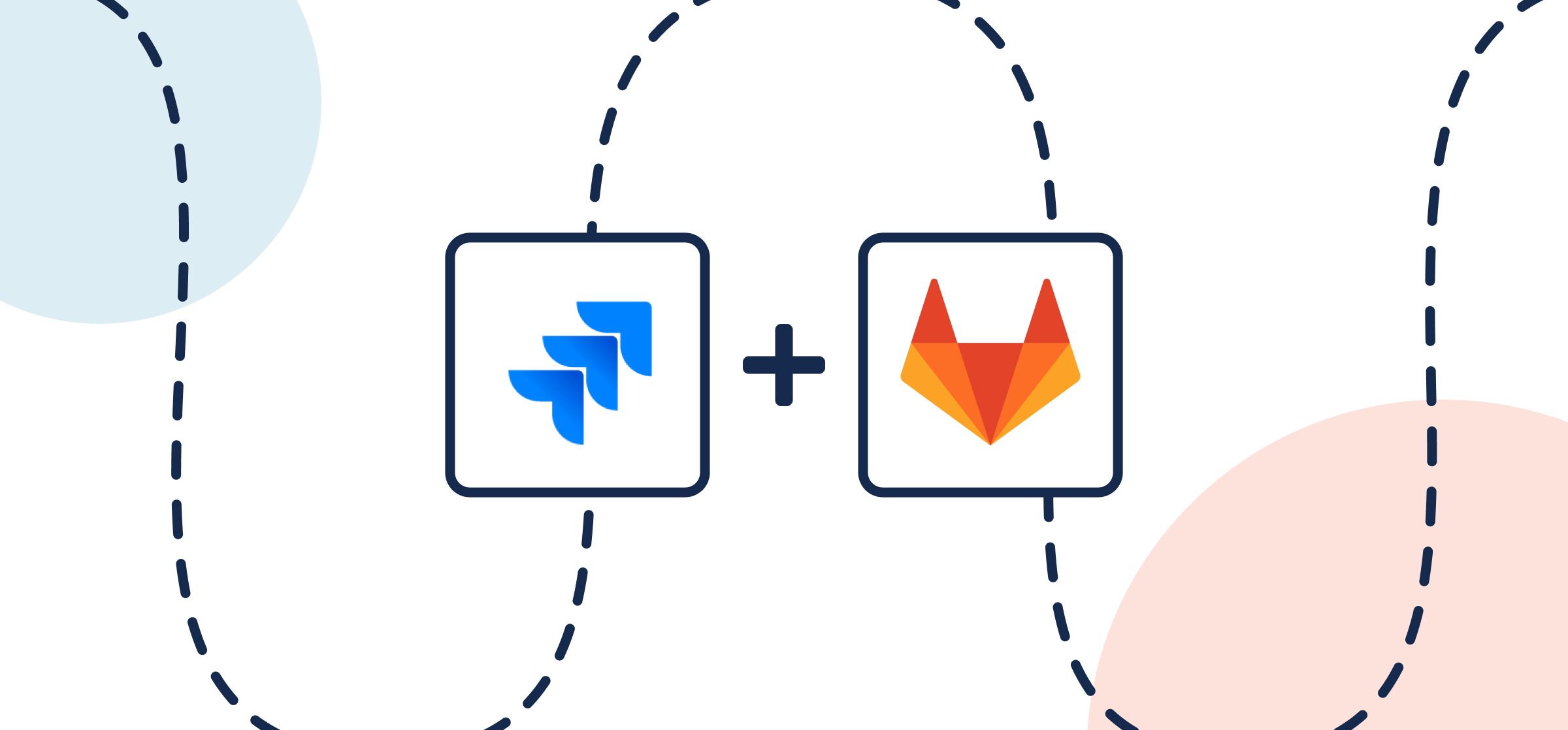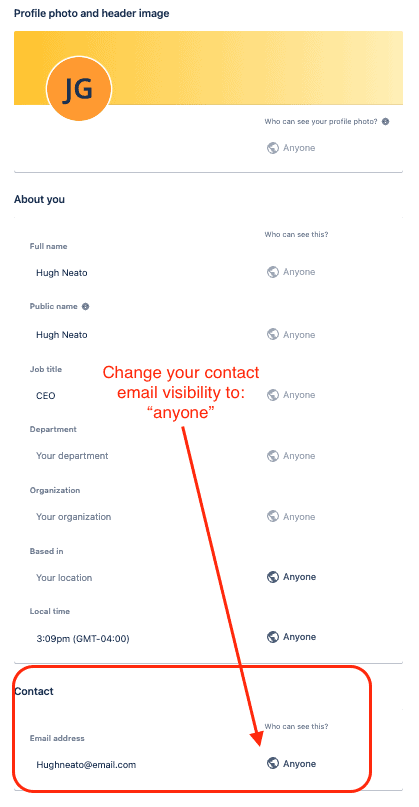How To Set Up a No-Code GitLab-Jira Integration
Do you have teams working in both Jira and GitLab simultaneously? How do you keep up with changes from end-to-end? If you find the manual process of copying updates back and forth tedious, you’re not alone. Many development teams struggle with the disconnect between their GitLab and Jira projects. So here’s one solution to help you keep them both in sync continually in real-time.
This article will show you how anyone can set up a secure, reliable 2-way integration between GitLab and Jira with automated updates in just 10-15 minutes. No code, no scripting, no troubleshooting or keeping up with API changes. Unito takes care of all that for you with a fully configurable, no-code solution that automatically populates itself with your fields from GitLab and Jira. The platform is SOC 2 Type II Compliant and Unito never stores user data. It is simply a bridge between projects that allows your key issue details to sync bi-directionally.
In this guide:
- Tools: GitLab and Jira
- Use cases: Software development, product management, task management
- Great for: Developers, engineers, project managers, product managers
By the end of this article, you’ll have a clear, integrated workflow that automatically:
- Creates new Jira tasks, issues or stories based on activity in your GitLab projects.
- Creates new issues in GitLab repository based on your activity in Jira.
- Updates Jira Cloud and GitLab in either direction automatically whenever manual changes occur.
This integration can be built with Jira Sync directly from your Jira interface or through Unito’s standalone sync platform.

Setup in Jira
If you’re connecting Jira to Unito via OAuth2, then you can simply follow the on-screen instructions when adding your account for the first time: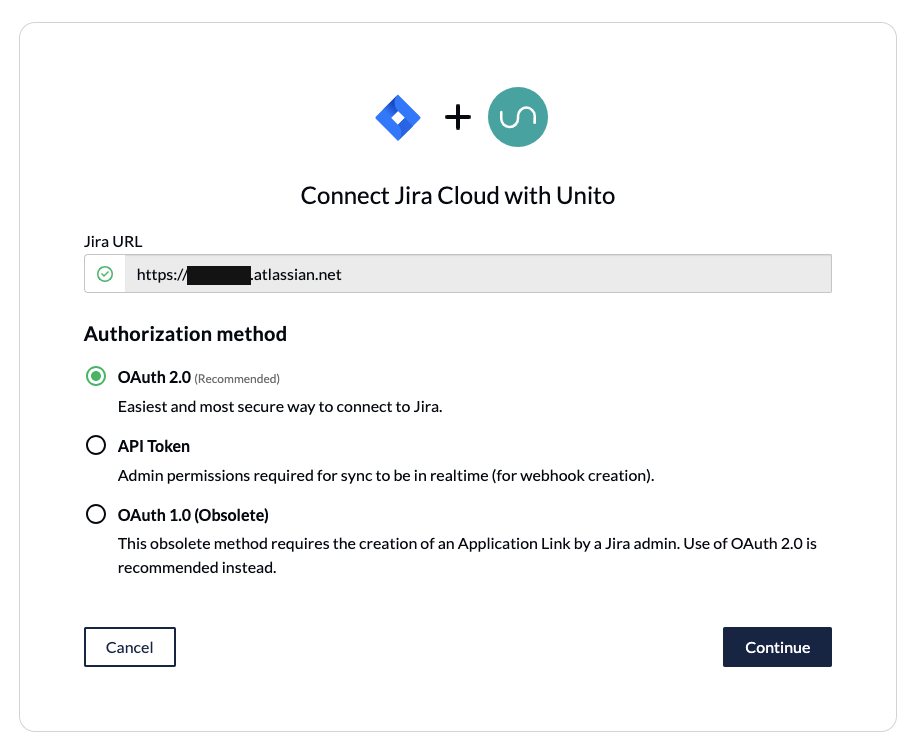
Here’s a separate guide on how to connect a local Jira Server on-premise to Unito. You can also connect your server via ngrok.
Here’s how to configure Jira if you aren’t using OAuth2 (click to expand)
There are a few steps involved before we can set up a two-way sync with Unito, but we promise it’s worthwhile. The benefit of eliminating manual tasks for your team indefinitely far outweighs the time it takes to set up your automation rules now. So let’s dive in.
- The Jira account connected to Unito must have administrator access with global permissions.
- Here’s a guide if you need help to configure Jira for Unito access before building your flow. Specifically you’ll need to:
- Set your Jira contact email visibility to anyone from your Jira profile page.
- Then, set up an application link in Jira so that your issues can sync to GitLab.
Step 1. Get your labels or custom fields organized
The number one piece of advice we offer all new Unito users about building their first flow is this:
Get organized first! Unito syncs work based on rules you provide. But in order to set conditions for your flow, those rules must be based on a certain logic related to your fields. For example, only sync Jira issues with the GitLab label.
You can even use single-select custom fields to apply new rules. Unito’s rules and field mappings adapt to your instances and use case!
Jira fields that can be used to set rules:
- Assignee
- Component
- Epic
- Fix version
- Flagged
- Issue status
- Issue type
- Label
- Priority
- Sprint
GitLab fields that can be used to set rules
- Assignee
- Label
- Milestone
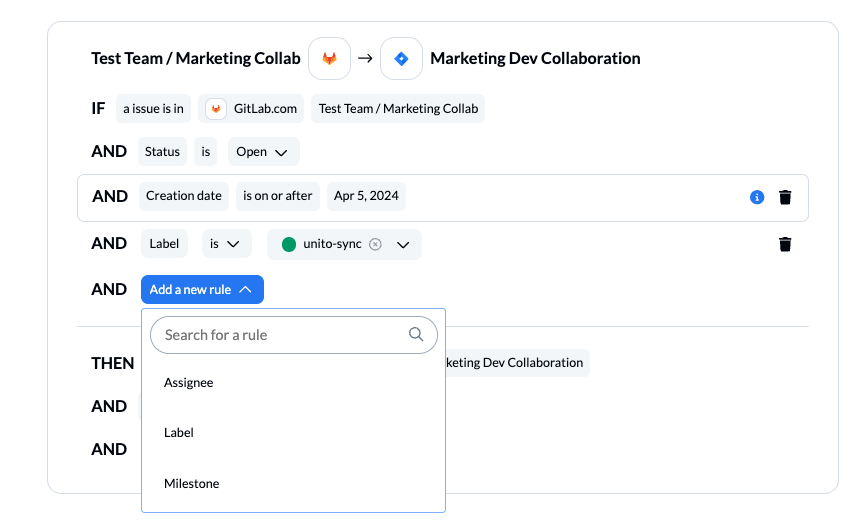
Step 2. Connect Jira and GitLab to Unito
- From the Unito App, select +Create Flow.
- Select Start Here to connect Jira and GitLab.
- Then +Choose account to pick an account for each tool.
- The first time you do this, you must go through a quick authorization sequence. Simply follow the on-screen instructions.
- Next, pick a Notion Database and Trello board to keep in sync.
- Click Confirm.
First, connect your GitLab account and Jira Cloud account to Unito. This process involves granting necessary permissions to Unito for accessing your GitLab and Jira projects.

Note: In order for Unito to create new issues in GitLab or Jira, the account connecting to Unito must have also have permission to create, edit, or otherwise modify those issues.
Step 3. Pick a direction for new GitLab or Jira issues
Flow direction determines how new issues in GitLab or Jira are created by Unito.
Later we’ll tell Unito which tasks and issues to keep synced.
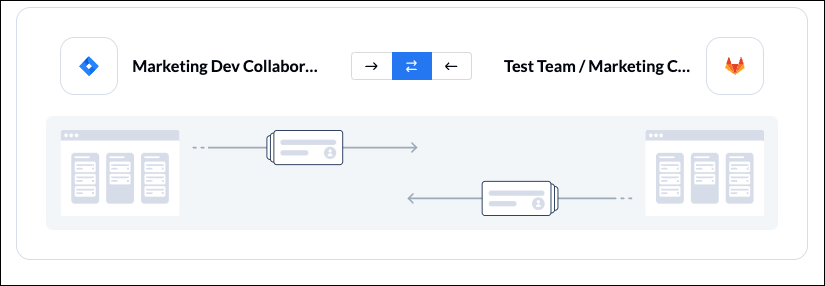
Select Confirm when you’ve chosen a flow direction.
Learn more about flow direction.
Step 4. Set rules to sync issues between Jira and GitLab
Set up rules to filter which GitLab issues and Jira issues to sync. This step ensures that only relevant data is shared between GitLab and Jira. If you chose a two-way flow, you’ll have to set rules for both directions.
Select Add a new rule to begin.
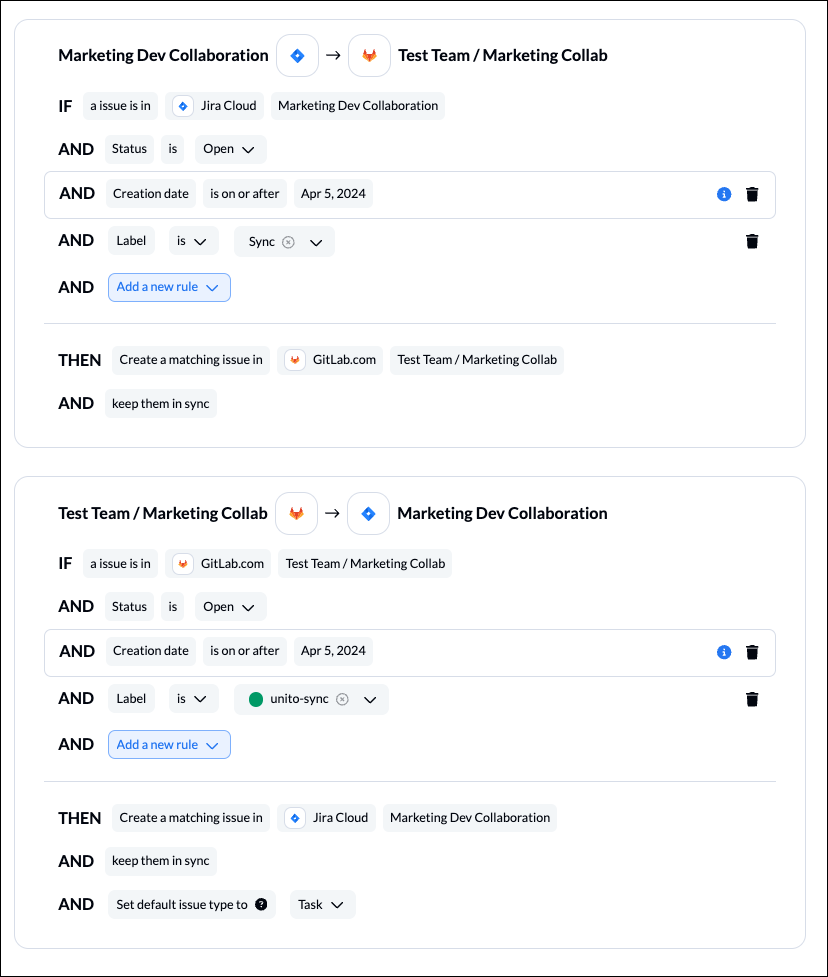
In the above examples, we’re syncing issues based on common labels and issue type in Jira and GitLab.
You can learn more about setting up rules here.
Step 5. Link fields between Jira and GitLab
Here you can choose which fields (details) to sync between GitLab and Jira to track information and deployment frequency data. This ensures that updates in pull requests or Jira issue keys are reflected on both platforms.
First, you’ll be asked whether you want to set up your field mappings from scratch or let Unito do this automatically.
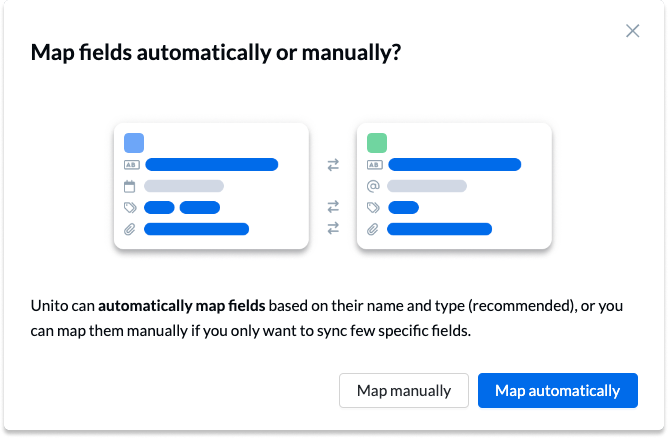
You can add additional mappings by selecting +Add Mapping, then Select a field in both tools to pair the fields together.
Here’s a look at our auto-mapped fields between GitLab and Jira:
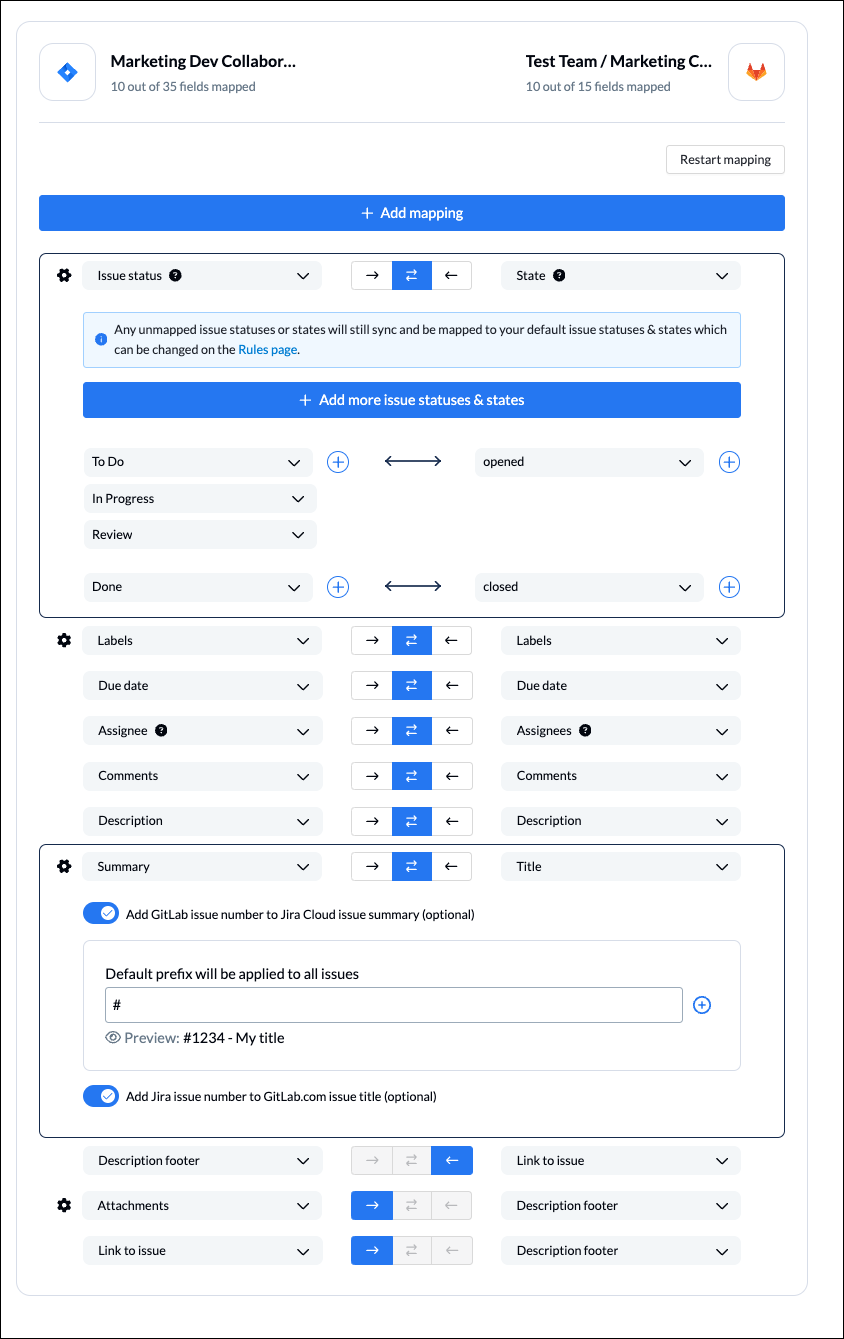
Most fields will automatically be mapped for two-way updates, but you can modify them individually if you prefer one-way updates in some cases.

Click Confirm to proceed.
Find out more about setting field mappings.
Step 6. Launch your GitLab Jira integration
Now it’s time to launch your GitLab-Jira integration. This integration facilitates project management, enhances team visibility, and improves deployment information sharing.
If you followed the steps above, your flow will now automatically create new issues in both tools based on specific activity in the other, while keeping paired fields up to date.
If you have any questions, don’t hesitate to reach out and let us know.
Ready to optimize your software projects?
Meet with our team to see what Unito can do for your workflows.
GitLab and Jira documentation for Unito users
- An Overview of Unito’s GitLab Integration
- Read more about Unito’s GitLab + Jira integration
- A Guide To Unito’s Jira Integration
- How to Configure Jira for Unito Access
- How to Specify Issue Type for New Jira Issues
- Troubleshooting a URL Mismatch Error When Connecting Jira
- How to Sync Jira Epics as Parent Tasks
- How to Use ngrok to Connect your On-Premise Jira Server or Data Center to Unito
What’s next after connecting GitLab and Jira with Unito?
Now that you’ve set up your integration between Jira and GitLab, you can unify project management and improve cross-team visibility across tools with real time two way updates.
You can also read more about Unito’s integrations for Jira and GitLab to better understand their capabilities and limitations.
- Duplicate this flow to build out a more expansive workflow with these same accounts without going through the same steps again.
- Need some inspiration? Here’s how we use this workflow to collaborate on dev work with external contractors.
- Or follow a similar guide to:
- Sync Jira to Notion
- Sync Jira with Asana
- Link Jira issues with Trello cards
- Connect Jira projects to Wrike
- Connect projects between Jira and Jira Service Management
- Sync tasks between Jira and monday.com
- Sync jira issues between multiple projects
- Connect Jira and HubSpot
- Link Jira to Azure DevOps
- Sync Jira issues to Airtable
- Link tasks between Jira and ClickUp
- Send Jira issues to an Excel spreadsheet
- Export Jira to Google Sheets
- Connect Jira Service Management to ServiceNow
- Send tickets from Zendesk to Jira
- Connect Jira to Smartsheet
- Sync Jira and Salesforce
Why connect GitLab with Jira?
Connecting GitLab and Jira saves time, helps teams and squads collaborate more efficiently, and turns both GitLab and Jira into a united source of truth.
The end result will be a simple workflow that enables you to automatically create and sync new issues in GitHub or Jira, based on manual changes in the other.
This 2-way integration is most useful for: software developers, quality assurance teams, product managers, DevOps teams, customer support, or cybersecurity specialists.
Streamlined collaboration between dev teams
Unito’s 2-way integration eliminates the need to search for specific issues or tasks. Instead, teams can simply stay in their preferred GitLab or Jira interface and watch those work items appear in their projects.
Facilitate software project management
Unito’s GitLab Jira integration becomes an invaluable asset for project managers juggling multiple teams at once. You can eliminate tool-switching and human error so you can focus on overseeing projects and reporting on progress.
FAQ
How does the GitLab-Jira integration improve project management for software development teams?
By linking GitLab to Jira, teams can automate the tracking of code changes, pull requests, smart commits, and issue resolution, enhancing collaboration and efficiency.
Can I integrate multiple GitLab organizations with a single Jira instance?
Yes, this integration works to enable any GitLab project to connect with a Jira project, enabling you to manage several projects and teams within a single Jira Cloud account.
How do I ensure that only relevant issues are synced between GitLab and Jira?
You can set up rules and filters based on labels, issue keys, or other criteria to ensure that only pertinent GitLab issues from a new project and Jira issues are synchronized.
How does the integration automatically sync deployment information between GitLab and Jira?
Integrating Jira with your GitLab organization leverages real-time syncing to automatically update deployment information in both tools. When a new deployment occurs in GitLab, the corresponding issue in Jira is updated with this information, and vice versa, ensuring both projects are always in sync.
Can I add more apps to the GitLab-Jira integration with Unito, and how does that work?
Yes, you can configure the integration to include other project management or development tools, even additional Jira accounts, creating a comprehensive ecosystem that automatically works together, ensuring seamless data flow and collaboration across all platforms. Browse Unito’s full list of connectors for more.
What is the significance of the issue key in syncing projects, and how is it used?
The issue key is a critical component in syncing projects as it serves as a unique identifier for issues after you integrate Jira. So, when connected GitLab, the issue key can be used to link commits, pull requests, and branch names directly to the corresponding Jira issue, automating the tracking of changes and facilitating easier navigation between the two platforms.
Can the integration help reduce cycle time by automatically updating issues across platforms?
By ensuring that updates, such as status changes or new comments, are automatically reflected across both GitLab and Jira, the integration helps in reducing the cycle time.
It minimizes the need for manual updates and checks in Jira server or GitLab cloud, streamlining the workflow and helping teams to move faster from development to deployment.
Who should sync GitLab and Jira with Unito?
Imagine a software development team working on a new feature for their product or application. The team might use GitLab for code repository management, pull requests, version control, and tracking code-related issues.
Meanwhile, a project management tool such as Jira software, on the other hand, might be used for sprint planning or tracking non-code related work.
But if there are issues in either project that need to get shared with the team in another tool, there’s no simple way to sync Jira and GitLab without Unito.
The biggest differentiator is the power of real-time 2-way updates between issues in Jira and GitLab. No native integration can keep your Jira tasks or issues in sync with GitLab in real-time. So, while it is possible to simulate 2-way sync with a series of complex automations and other platforms, only Unito was built to achieve this quickly and easily for users of all backgrounds and experience.

